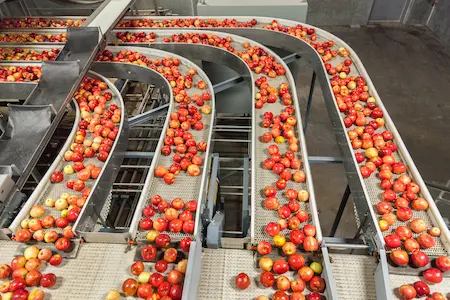 Food and beverage facilities clean their property everyday, but the risk of bird contamination is sometimes neglected.
Food and beverage facilities clean their property everyday, but the risk of bird contamination is sometimes neglected.
Pest birds like pigeons and sparrows can cause operational disruptions and damage property. If you’ve noticed increased bird activity or nesting around your facility, contact McCloud Pest Solutions for professional bird control and prevention strategies.
Health risks caused by birds
Although birds may appear harmless, they can carry pathogens, fungal spores, and ectoparasites. These risks can spread through their feathers, nests, or droppings. Birds have been associated with over 60 diseases, including histoplasmosis, encephalitis, Salmonella, toxoplasmosis, and West Nile virus.
Business risks caused by birds
Even one bird or signs of activity in a food processing facility can interfere with operations. If discovered during a health or regulatory inspection, recorded bird activity could lead to shutdowns or plant closures. During third-party audits, bird presence may also impact business relationships and result in costly fines for violations.
Addressing a bird issue requires more than a quick fix. Many species are protected under federal, state, and local laws, meaning actions like relocation or nest removal could lead to legal and financial consequences. Seeking expert guidance before taking action helps ensure compliance with these regulations.
Which birds are frequent pests?
A variety of bird species can be challenging for food processing facilities, but some are more troublesome than others.
Smaller birds can easily find their way indoors, such as:
- English house sparrows
- Common European starlings
- Swallows
Larger birds usually stay outdoors, but they can still contribute to roof and structural damage, such as:
- Pigeons
- Seagulls
What factors make food facilities more attractive to birds?
The surrounding environment of a food processing facility unfortunately does influence bird activity. Sites near water, landfills, or feed mills often attract larger bird populations and may demand additional control measures.
Inside the facility, specific conditions can make the space more appealing. Birds are often attracted to:
- Unsecured dumpsters and outdoor spills. These provide birds with an easy food source.
- Overhangs that create sheltered nesting spots, making them a prime location for birds to settle.
- Structural gaps in corrugated siding, soffits, and weep holes, offering them additional nesting opportunities.
- Worn dock door bumpers which trap food debris, attracting birds searching for a nesting site.
- Open windows and doors used for ventilation or accessibility that give birds direct entry.
- Gaps around doors, even a small hole can be enough for birds to simply walk inside.
How do birds spread contamination?
Birds can introduce contamination in food processing facilities by entering the building or gathering on rooftops.
Open doors provide easy access, and some bird species are smart enough to learn when these openings will be available. Once inside, they may fly through the facility or settle on rafters and other elevated surfaces, where droppings can fall onto production lines or stored products, increasing contamination risks.
Rooftops also attract birds, giving them a high nesting point to locate food and shelter. HVAC systems, mechanical equipment, and air circulation units generate warmth, making birds huddle around them. As these systems operate, they can pull in feathers and droppings, potentially circulating contaminants throughout the facility.
The first 5 steps to protect your business
Preventing bird contamination is essential for any food processing facility. Partnering with a bird control specialist can help determine the most effective strategies based on your facility’s layout and environment.
To stay on top of bird management, consider taking these proactive measures:
1.Keep doors and windows secured.
Birds often enter through doors left open for ventilation or convenience. Installing screen doors helps maintain airflow while preventing entry, and strip doors create a flexible barrier that allows humans to walk through while discouraging birds. Encouraging staff to keep doors and windows closed when not in use further reduces the likelihood of birds getting inside.
2. Consult professionals for bird exclusion solutions.
Installing netting beneath overhangs can discourage birds from nesting or roosting in these sheltered spots. This approach also helps reduce bird activity near entry points, making it more difficult for them to gain access indoors.
3. Install perch deterrents in outdoor areas where birds tend to gather.
Options like spikes and electric tracks create unwelcoming surfaces without causing harm, prompting birds to seek alternative roosting spots and reducing their presence around the facility.
4. Close gaps at dock doors when trucks are present and inspect the building for small openings.
Even the smallest gaps can allow birds to enter, making regular inspections essential. Pay special attention to delivery and pickup areas, as these spots frequently attract birds and create entry opportunities.
5. Train staff on bird prevention strategies.
Employees may not always recognize the issues birds can create. Be sure to educate them on potential risks and effective prevention methods, emphasizing prompt cleanup, proper product storage, and waste management to make the facility less appealing to birds. Assigning a team member to manage garbage and dumpster areas can further limit food sources and nesting materials.
Additional control methods, such as hazing techniques or plant management, could also be useful for your business. The best approach will depend on your facility’s layout, the bird species present, and surrounding conditions.
Professional bird control for your business
A single bird can lead to unexpected disruptions for any business, don’t let it be yours.
If you’ve noticed increased bird activity around or inside your facility, reach out to the specialists at McCloud Pest Solutions. Scheduling a consultation at the first sign of a problem can help keep your operations running efficiently.
Protecting Food Processing Facilities from Birds Pest Control and Exterminators in the Midwest
Serving...